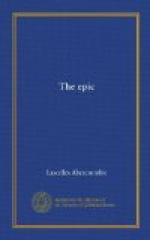Those features of it which make for tedium when it
is read—repetition, stock epithets, set
phrases for given situations—are the very
things best suited, with their recurring well-known
syllables, to fix the attention of listeners more
firmly, or to stir it when it drowses; at the least
they provide a sort of recognizable scaffolding for
the events, and it is remarkable how easily the progress
of events may be missed when poetry is declaimed.
Indeed, if the primitive epic poet could avoid some
of the anxieties peculiar to the composition of literary
epic, he had others to make up for it. He had
to study closely the delicate science of holding auricular
attention when once he had got it; and probably he
would have some difficulty in getting it at all.
The really great poet challenges it, like Homer, with
some tremendous, irresistible opening; and in this
respect the magnificent prelude to
Beowulf may
almost be put beside Homer. But lesser poets
have another way. That prolixity at the beginning
of many primitive epics, their wordy deliberation in
getting under way, is probably intentional. The
Song of Roland, for instance, begins with a
long series of exceedingly dull stanzas; to a reader,
the preliminaries of the story seem insufferably drawn
out. But by the time the reciter had got through
this unimportant dreariness, no doubt his audience
had settled down to listen. The
Chanson d’Antioche
contains perhaps the most illuminating admission of
this difficulty. In the first “Chant,”
the first section opens:[4]
Seigneurs, faites silence; et que tout
bruit cesse,
Si vous voulez entendre une glorieuse
chanson.
Aucun jongleur ne vous en dira une meilleure.
Then some vaguely prelusive lines. But the audience
is clearly not quite ready yet, for the second section
begins:
Barons, ecoutez-moi, et cessez vos querelles!
Je vous dirai une tres-belle chanson.
And after some further prelude, the section ends:
Ici commence la chanson ou il y a tant
a apprendre.
The “Chanson” does, indeed, make some
show of beginning in the third section, but it still
moves with a cautious and prelusive air, as if anxious
not to launch out too soon. And this was evidently
prudent, for when the fourth section opens, direct
exhortation to the audience has again become necessary:
Maintenant, seigneurs, ecoutez ce que
dit l’Ecriture.
And once more in the fifth section:
Barons, ecoutez un excellent couplet.
In the sixth, the jongleur is getting desperate:
Seigneurs, pour l’amour de Dieu,
faites silence, ecoutez-moi,
Pour qu’en partant de ce monde vous
entriez dans un meilleur;
but after this exclamation he has his way, though
the story proper is still a good way off. Perhaps
not all of these hortatory stanzas were commonly used;
any or all of them could certainly be omitted without
damaging the poem. But they were there to be used,
according to the judgment of the jongleur and the
temper of his audience, and their presence in the
poem is very suggestive of the special difficulties
in the art of rhapsodic poetry.




